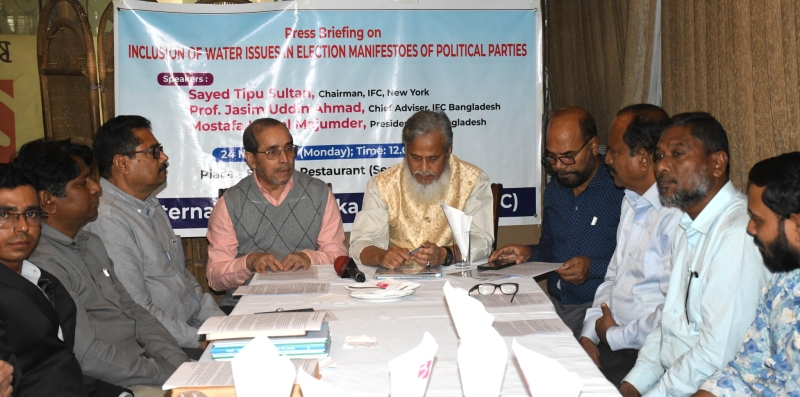- Cracks appear at newly built Secretariat building after quake |
- Dhaka’s air quality 4th worst in the world Tuesday morning |
- Bangladesh Bank extends loan rescheduling facility for defaulters |
- Divided journos end up serving politicians: Mirza Fakhrul |
- Naogaon residents battle dengue surge as urban services falter |
Include the issue of river and water rights in the election manifestos: IFC

International Farakka Committee (IFC) held a press briefing urging political parties to include river and water issued in their election manifestos. Photo - Rafique
Bangladesh has originated from rivers. This country is called the largest delta
in the world. The flow of all the rivers of the Eastern Himalayas through this
country, located in the lower reaches of the Ganges, Brahmaputra and Meghna,
has been falling into the Bay of Bengal since time immemorial.
Most of the territory of Bangladesh has been formed by the accumulation of
sediment carried by these rivers. The huge flow of water from these rivers
protects the environment, livelihood, biodiversity and ecological balance of
Bangladesh. But since 1975, the ecological balance and existence of this
country have been threatened by the construction of dams upstream of 54 of the
57 common rivers flowing through this country. It is the responsibility and
duty of all citizens to protest against this and protect the river
and water rights of the people of Bangladesh.
Elections are ahead. It has already been announced that the elections to the
National Parliament will be held in the first half of next February. All the
parties that will participate in the elections are busy preparing their
election manifestos.
We, the International Farakka Committee (IFC), through you, the newspapers and
media workers, are calling on all registered and unregistered political parties
and groups to speak out against the diversion of the rivers of Bangladesh and
to strengthen the demand for maintaining the natural flow of the rivers.
We especially demand that the parties that will participate in the elections
should highlight their position on the issue of the life and death of the
people of this country in their election manifestos and reassure everyone.
As you know, more than 90 percent of the water of the various rivers flowing
through Bangladesh comes from upstream. Floods come during the rainy season. 33
percent of the country's areas are flooded during normal monsoons. In the dry
season, river water plays a direct role in maintaining agriculture, fisheries,
navigation, business, commerce and industry as well as maintaining
environmental balance. But hundreds of rivers are dying due to the construction
of dams upstream of all the shared rivers by large neighbour India and the
diversion of water elsewhere. In the southwestern part of the country alone,
more than 30 rivers have died in the Ganges-dependent areas. There is no water
in the Gorai, the main distributary of the Ganges during the dry season. As a
result, an environmental disaster has occurred in the southwestern part of the
country. The world's largest mangrove forest, the Sundarbans, is under threat
of its existence.
The 30-year Ganges Water Treaty is expiring in December next year. The treaty
did not contain any guarantee of water or a mechanism for mediation to resolve
disputes over the agreement. That is why Bangladesh has not been able to make
any significant statements regarding the availability of water.
On the other hand, the Teesta Water Treaty was supposed to be concluded in
2011, but it has not been concluded yet. In the absence of the treaty, all the
dry season water is being withdrawn from the Ghazoldoba barrage in West Bengal
in India. However, during the monsoon season, flood water is released into
Bangladesh without notice, causing catastrophic floods. Last monsoon, there
were five consecutive floods in the Bangladesh part of the Teesta.
There is no agreement on the other 52 rivers flowing through India. But the
flow of water in Bangladesh is being controlled by building dams or reservoirs
on each river. If this situation continues, the existence of Bangladesh is
going to be endangered.
This situation has further deteriorated due to the knee-jerk foreign policy and
the water policy of keeping the neighbours happy for the past 16 years. In the
interest of protecting the geographical existence of the country and upholding
independence and sovereignty, all our political parties and groups must raise
their voices. Make a comprehensive agreement for the receipt of water from the
common rivers while maintaining their ecological flows. There must be an
arbitration clause to resolve disagreements in this regard and a guarantee of
receipt of water according to the terms of the said agreement.
If the water problem is not resolved through mutual understanding, it must be
raised at the United Nations, if necessary. Because if the water problem is not
resolved, the existence of Bangladesh will be threatened.
Mostafa Kamal Majumder, President, International Farakka Committee (IFC),
Bangladesh.
Presented at a press briefing held at a local restaurant in Dhaka on November 24, 2025

